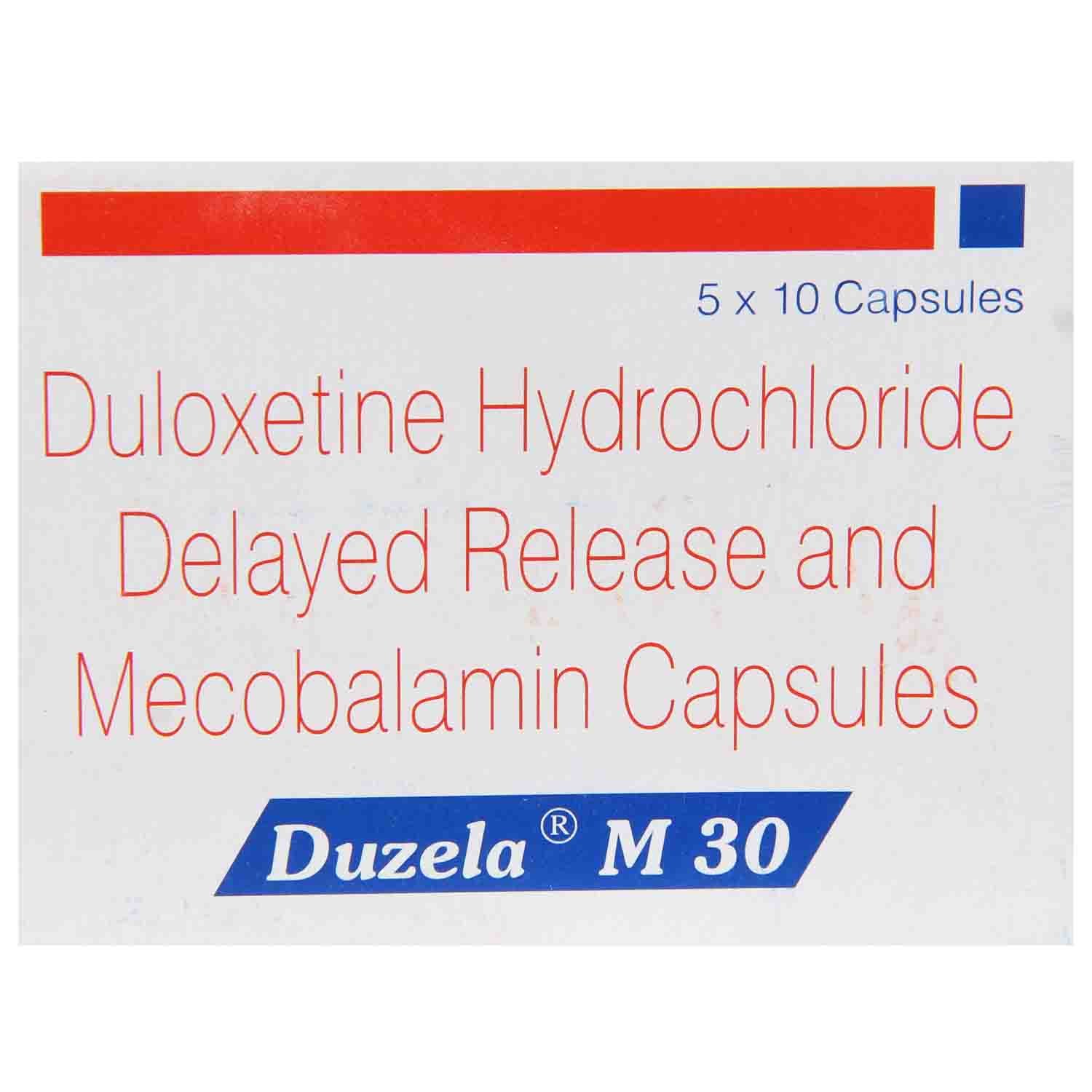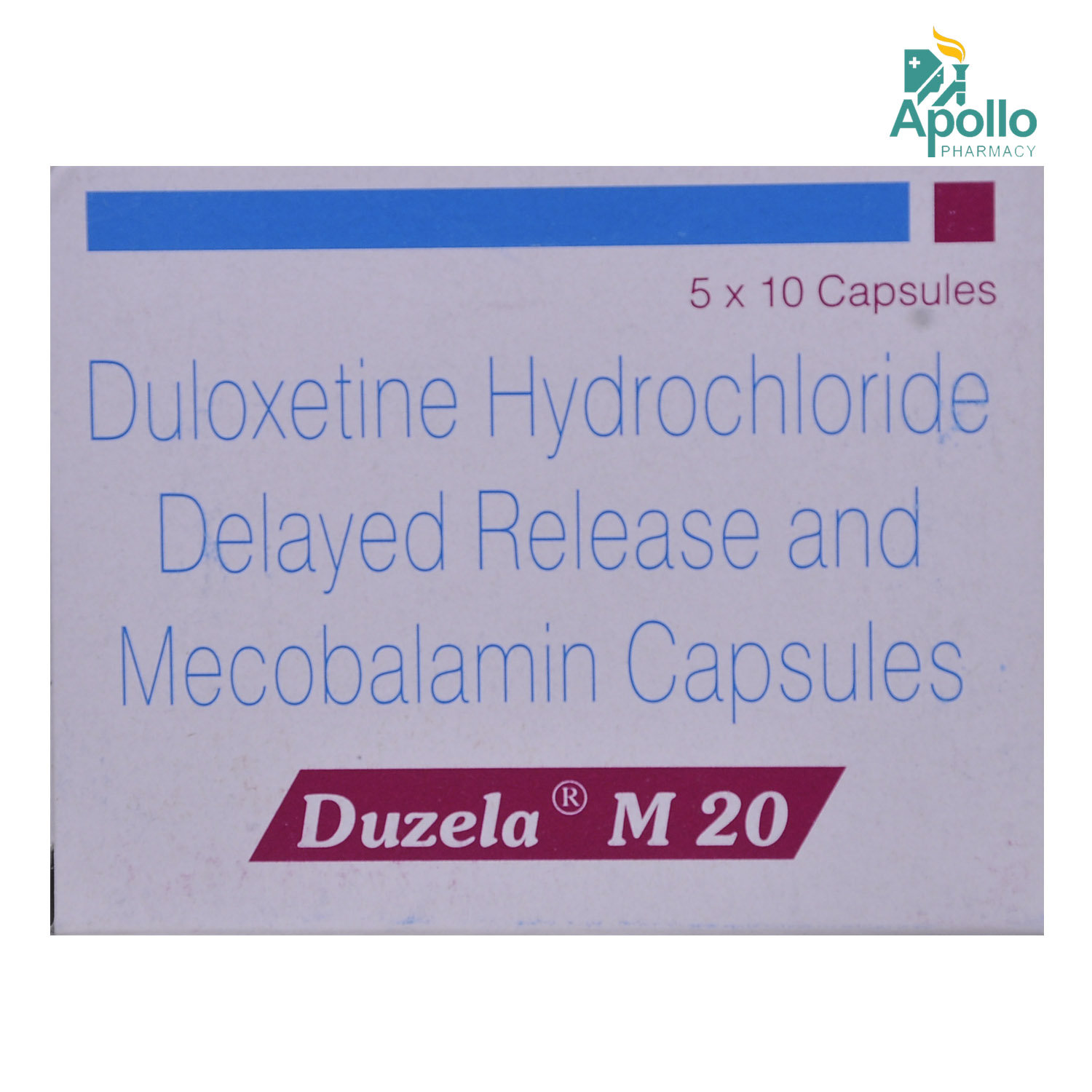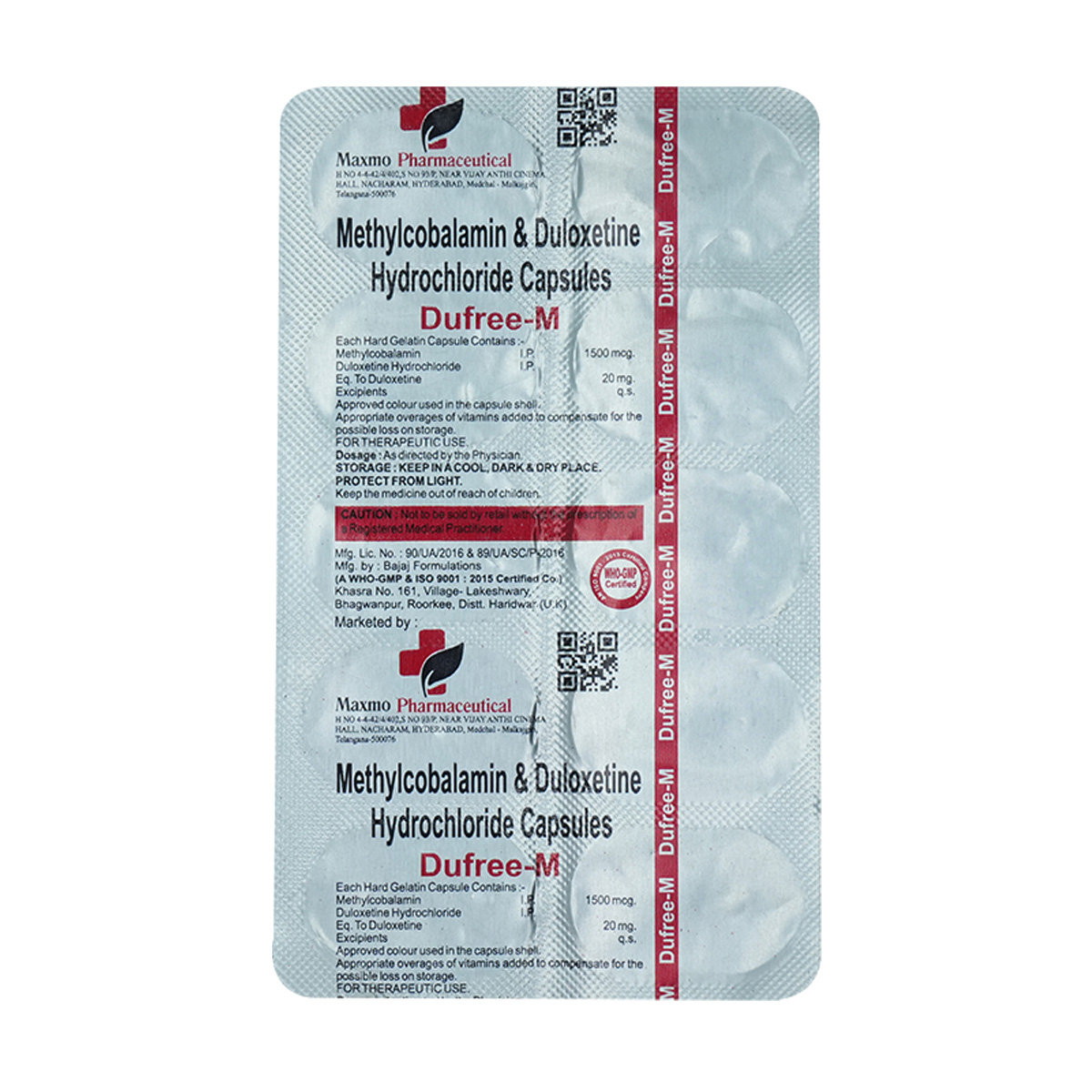Duloxetine+methylcobalamin
About Duloxetine+methylcobalamin
Duloxetine+methylcobalamin belongs to the class of medications called ‘anticonvulsants’ used to treat neuropathic pain. Neuropathic pain is a chronic (long-term) progressive nerve disease that causes nerve pain due to nerve damage or the nervous system's malfunctioning. It is mostly seen in patients who had suffered a trauma or nerve injury, diabetes, vitamin deficiencies, cancer, multiple sclerosis (disease of the brain and spinal cord), shingles (a viral infection), and HIV.
Duloxetine+methylcobalamin is a combination of two medicines: Duloxetine and Methylcobalamin. Duloxetine is a selective-serotonin reuptake (SSRI) inhibitor that works by increasing the levels of a chemical messenger (like serotonin and noradrenaline) in the brain required to regulate pain that travels through damaged nerves. On the other hand, Methylcobalamin is a form of vitamin B12 that helps rejuvenate and protect damaged nerve cells by producing a substance called myelin (a protective layer of nerve cells).
Take this medicine as prescribed by your doctor. Duloxetine+methylcobalamin may cause side-effects such as drowsiness, nausea, constipation, headache, dry mouth, increased sweating, anorexia (loss of appetite) and hot sensation (burning pain). Inform your doctor if any of these side-effects persist.
Do not take Duloxetine+methylcobalamin if you are allergic to Duloxetine, Methylcobalamin, or any contents of it. Before taking Duloxetine+methylcobalamin, inform your doctor if you have liver or kidney disease, seizures (fits), mania, bipolar disorder, glaucoma (an eye condition), bleeding disorders, or at risk of hyponatremia (low sodium levels, especially in patients taking diuretics or water pills). It is not recommended for use in children and young adults as it increases the risk of suicidal tendencies. Inform your doctor if you are pregnant or breastfeeding before using Duloxetine+methylcobalamin.
Uses of Duloxetine+methylcobalamin
Medicinal Benefits
Duloxetine+methylcobalamin is a combination of two medicines: Duloxetine and Methylcobalamin. Duloxetine is a selective-serotonin reuptake (SSRI) inhibitor that increases serotonin levels and noradrenaline in the brain required for regulating pain through the damaged nerves. Methylcobalamin is a form of vitamin B12 that helps in rejuvenating and protecting damaged nerve cells by producing a substance called myelin (a protective layer of nerve cells). Together, Duloxetine+methylcobalamin effectively treats neuropathic pain, improve nerve conduction for proper nerve signal functioning in the body.
Directions for Use
Storage
Side Effects of Duloxetine+methylcobalamin
- Drowsiness
- Nausea
- Constipation
- Headache
- Dry mouth
- Increased sweating
- Anorexia (loss of appetite)
- Hot sensation (burning pain)
Drug Warnings
Before taking Duloxetine+methylcobalamin, inform your doctor if you have taken any antidepressants within the last 14 days or any medications used to treat infections. Please consult your doctor before stopping the medicine as it may cause withdrawal symptoms such as dizziness, tingling sensation, sleep disturbances, restlessness, nausea or vomiting, headache, or excessive sweating. So, do not abruptly stop taking medicine even if your symptoms improve. It may increase suicidal thoughts, so it is advised to use caution in patients with mania, bipolar disorder or depression. Prolonged use of Duloxetine+methylcobalamin may decrease sodium level, affect blood pressure, and blood sugar level, so regular medical check-ups are required. Duloxetine+methylcobalamin may increase your bleeding risk, and worsen your glaucoma condition. Hence, if you experience any eye problem or a bleeding problem, consult a doctor.
Drug Interactions
Drug-Drug Interaction: Duloxetine+methylcobalamin may interact with antidepressants (moclobemide, paroxetine, fluoxetine, venlafaxine, clomipramine, and amitriptyline), antibiotic (linezolid), opioid analgesic (tramadol), and a herbal medication used to treat skin problems (Hypericum perforatum).
Drug-Food Interaction: Avoid alcohol consumption while using Duloxetine+methylcobalamin.
Drug-Disease Interaction: Duloxetine+methylcobalamin should be used with caution in patients with liver diseases, kidney diseases, heart problems, glaucoma (increased pressure in the eye), alcoholism, drug abuse, and suicidal tendencies.
Drug-Drug Interactions Checker List:
Safety Advice

Alcohol
cautionAlcohol may worsen the condition by increasing the risk of side-effects

Pregnancy
unsafeDuloxetine+methylcobalamin is a category C medicine, so it is not recommended for use in pregnant women.

Breast Feeding
cautionDuloxetine+methylcobalamin should be used with caution in breastfeeding mothers.

Driving
cautionDuloxetine+methylcobalamin may cause drowsiness. So, avoid driving or operating heavy machinery while using Duloxetine+methylcobalamin.

Liver
cautionDuloxetine+methylcobalamin should be used with caution in patients with liver diseases.

Kidney
cautionDuloxetine+methylcobalamin should be used with caution in patients with kidney diseases.

Children
unsafeDuloxetine+methylcobalamin is not recommended for children and anyone below 18 years. Please seek medical advice for more information.
Habit Forming
Diet & Lifestyle Advise
- Include food rich in vitamin B and D in your diet.
- Include cayenne pepper in your diet as it can help in lowering neuropathic pain.
- Exercising regularly helps in improving overall health and combating pain.
- Rest well, get plenty of sleep.
- Try taking a warm bath as it can be soothing.
- Avoid smoking and alcohol consumption.
- Meditation and yoga can help lower stress, decrease pain sensitivity, and improves coping skills.
- Acupuncture can be helpful by stimulating pressure points.
- Using essential oils for massages can help increase circulation.
Special Advise
- Increased risk of suicidal thinking and behavioural change in children below 12 years, and young adults taking Duloxetine+methylcobalamin for major depressive disorder (MDD) and other psychiatric disorders. Hence, the use of Duloxetine+methylcobalamin is not approved for use in pediatric patients.
- If you experience small increases in fasting blood glucose, HbA1c, and total cholesterol (TC) levels, immediately contact a doctor.
- Regular blood pressure monitoring is required while using Duloxetine+methylcobalamin.
Patients Concern
Disease/Condition Glossary
Neuropathic pain: Neuropathic pain is a chronic progressive nerve disease, infection, or injury caused due to damaged sensory nerves. Pain could be intermittent or continuous, which is felt as a prickling, stabbing, tingling, or burning sensation. A feeling of numbness and loss of sensations is also common with neuropathic pain. In normal condition, our body sends the pain signals when there is an injury, but in neuropathic pain, pain is not triggered by an injury, the body unpromptedly sends the pain signals. Symptoms include spontaneous, untriggered pain, unpleasant feeling, shooting, burning or stabbing pain, difficulty resting or sleeping, and evoked pain (pain caused by events usually not painful).
FAQs
Duloxetine+methylcobalamin is a combination of two medicines: Duloxetine and Methylcobalamin. Duloxetine increases the number of neurotransmitters like serotonin and noradrenaline in the brain that can regulate pain. On the other hand, methylcobalamin (vitamin B12) can protect the nerve cells from further damage. Thus, Duloxetine+methylcobalamin prevents nerve damage due to various conditions like injury or diabetic neuropathy and smooth conduction of nerve signal throughout the body.
Duloxetine+methylcobalamin should be taken either in the morning or evening. If you feel drowsy after taking Duloxetine+methylcobalamin, consider taking it in the evening. Also, it is recommended to take Duloxetine+methylcobalamin every day at the same time for the best results.
Duloxetine+methylcobalamin should not be used with antidepressants, especially antidepressants like monoamine oxidase (MAO) inhibitors (moclobemide, linezolid) as they cause serious side-effects. It is advised to wait at least 14 days after stopping MAO inhibitors before taking $namd also wait at least 5 days after stopping Duloxetine+methylcobalamin before taking any MAO inhibitors.
Seek medical attention immediately if you notice any depressive thoughts while using Duloxetine+methylcobalamin. Your doctor may change the dose or medicine to treat your condition.







